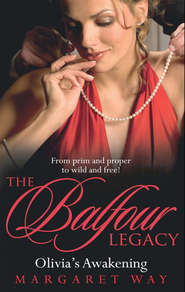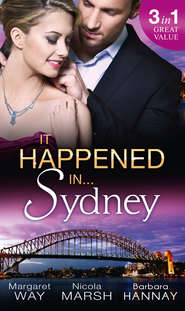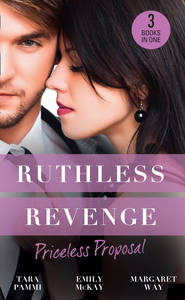По всем вопросам обращайтесь на: info@litportal.ru
(©) 2003-2024.
✖
Master of the Outback
Автор
Год написания книги
2018
Настройки чтения
Размер шрифта
Высота строк
Поля
“And so would countless numbers of people,” Genevieve said, torn by an urge to rattle Liane Rawleigh’s cage.
Here was a woman potentially dangerous. A snap judgement, but she was pretty sure her instincts were spot-on. Liane Rawleigh was a proud woman, a vengeful woman. A woman who barely beneath the surface was filled with discontent, possibly a total dissatisfaction with her life. And why not? She still loved Trevelyan. The break-up of any engagement was an emotionally wrenching turn of events. No one knew that better than she. She started to look for excuses. Maybe the abrasive manner was a cover-up? It wasn’t easy dealing with a sense of failure, hurt and humiliation. But where was the compassion for Sondra Wakefield, let alone the grieving living Kit? Liane sounded as if she despised Sondra Wakefield. That telling catch-as-catch-can. What could have inspired that?
“Are you certain it was a marriage on the rebound?” she found herself asking, in perhaps too probing a voice.
“I should be.” Liane’s glare was hard and intense. “Who are you, anyway? Some sort of counsellor? As far as I know you’ve been employed by Hester to do the job of ghostwriting.”
“I merely asked a question.” Genevieve’s reply was mild, though she felt exposed to this woman’s dark side.
Liane lifted a haughty chin. “To answer your question, I turned Kit Wakefield down at least twice.”
“Oh, I see.” Genevieve spoke as though she’d been offered a more than adequate explanation. “I understood you were engaged to Bret Trevelyan at one time?”
What did she have to lose by asking a few pertinent questions—or impertinent questions for that matter? She needed to know a great deal more about everyone within the Trevelyan circle. Throw out a few challenges if she had to.
“Nothing to do with you.” The startling blue eyes flared like the sun off ice.
“Forgive me. I didn’t mean to upset you.” Genevieve spoke with what she hoped was an appropriate note of apology.
Liane shrugged, a bitter smile running across her mouth. “What happened was that I got tired of waiting for Bret to set a date for our wedding. It’s always Djangala. He’s married to the place. I admit it’s a huge responsibility. Too much has been put on his shoulders right from when he was a kid. But I wasn’t going to take second place. Not me!”
She wasn’t speaking the truth. No way had Liane Rawleigh decided to break off the engagement. She was still crazily in love with him. Liane was also sure Trevelyan wouldn’t talk about it, allowing her to put whatever spin she liked on their split.
“So how long do you think you’ll be here?” Liane’s eyes returned to fixating on Trevelyan’s tall, commanding figure. Obviously every moment of time with him was precious.
“I have six months at my disposal.” Genevieve felt a stab of pity for her.
Liane’s head snapped back. “Surely it won’t take that long?” She looked as if she was struggling to come to terms with it. “Hester has gathered all possible documentation. You won’t have to conduct any searches. She’s been at it like a bower bird for years on end. She has the Trevelyan family history at her fingertips—both from Cornwall and Australia.”
“Six months isn’t a long time,” Genevieve pointed out. “I’m surprised you would think it is. The first draft must be completed. The final draft can be done elsewhere, but I’ll have my work cut out even then.”
“Well, that’s what you’re here for, isn’t it?” Liane asked with cold rationalisation. “To work?”
“Certainly. But I intend to take my time off. I want to see Uluru and the Olgas again. Bret did say he would make that possible.”
The finely arched black brows shot to her hairline. “Bret did?” Liane’s stare could have drilled a hole in a steel door. She actually looked quite savage. They might have been enemies on a battlefield.
“I imagine he could organise it,” Genevieve responded with composure. “He didn’t say he would take me, of course. I appreciate he’s a very busy man. Maybe Derryl?”
A look of amusement crossed Liane’s high-mettled face. “You’re not Derryl’s type, my dear. Derryl likes glamour girls, not academics. Besides, Derryl can’t fly the Beechcraft. I wouldn’t go making any plans either. Hester will keep you extremely busy. She’s a very domineering old b—biddy.” She’d nearly said bitch—stopped just in time. “Thinks she’s far more important in the scheme of things than she is. We never did get on. I tried, but pretty soon I didn’t bother. I know she did her utmost to influence Bret against me. Unforgivable in my book. Don’t worry, Ms Grenville, you’ll be expected to toe a fine line.”
“I assure you I haven’t thought differently.” Genevieve’s answer was mild. “Nevertheless, I’m entitled to my time off. That was part of our agreement.”
“Make sure Uluru and the Olgas are your only distractions.” Liane’s stare was very direct.
It was an unequivocal warning.
“What are you saying?”
“You know what I’m saying,” Liane answered bluntly. “You’re not that dumb.”
Genevieve gave a faint laugh. “I’m not dumb at all.”
“No, just dull.”
Genevieve didn’t respond to the jibe. “So why are you worried?” She decided to have a crack at Liane. It wasn’t as though she was in any danger of becoming Liane’s next best friend.
“Worried?” Liane sounded furiously affronted.
Genevieve pressed on regardless. “You have no need to be. I promise I won’t lose sight of why I’m here.”
It was as well Trevelyan was coming back. She’d had about enough of Liane, who would have her work cut out, constantly warning off any young woman she perceived to be a threat.
Even a dull ghostwriter who just happened to be hiding in plain sight.
CHAPTER THREE
GENEVIEVE had never seen anything like the remote splendour of Djangala. The sun blazed down on innumerable lagoons, creeks, swamps, and billabongs, the water throwing back reflections of thousands of small suns and glittery pinpoints of diamond-like light. Anyone would have been thrilled by it all. She was conscious of nature and its power as she had never been in the city. Nature was sublime—whether it worked for you or catastrophically against you.
All the waterways were bordered by verdant trees and vegetation in striking contrast to the rust-red of the plains that stretched away to the horizons. Desert oaks dotted the vast empty terrain, and acacias more abundant than gums in arid areas, with large areas of mulga woodlands that abounded with what seemed like thousands and thousands of small yellow wildflowers.
A hundred or more emu—Australia’s endemic flightless bird—disturbed by the descending aircraft, were streaking across the landscape at a rate of knots. She knew when threatened they could reach speeds of up to sixty miles per hour. It was fascinating to watch their flight. The kangaroos had to be taking their midday siesta. She could only spot ten or so, in a loosely knit group. Some were standing upright like a man, balancing on powerfully muscular hind legs and long tail, others were attending meticulously to their grooming,licking their forearms. It was an endearing sight to see the two wild animals that held the nation’s coat of arms aloft in their natural habitat.
The great Djangala herd, like that of its neighbouring station, Kuna Kura Downs, was strung out across the open plains. Large sections were being driven towards waterholes to drink.
There couldn’t have been a better way to appreciate the awe-inspiring landscape than from the air. From her wonderful vantage point she could look down on Djangala’s homestead, surrounded at a distance by numerous satellite buildings. It was a far bigger enterprise than Kuna Kura. She was struck by the thought that, had things gone to plan, two Outback dynasties might have been united in marriage.
And aren’t you glad it didn’t happen?
Safely on the ground, they were met by a Jeep manned by a laconic individual called Jeff, who was waiting to drive them up to the house. The way he straightened immediately out of his slouch told Genevieve the boss was held in very high regard indeed. She supposed out here Trevelyan was king of all he surveyed. Yet for all his commanding manner and self-assurance she hadn’t detected any arrogance. Derryl, who hadn’t inherited the reins, was the arrogant one.
The long driveway was an allee of long-established palms with waving mop-heads. Genevieve sat forward as they approached the main compound, with its eight-foot-high enclosing wall that offered protection against the dust storms that periodically swept in from the desert. The towering sand hills had been an amazing sight from the air, running as they did in parallel lines, like the giant waves of the ocean. The sand even gave the illusion of being composed of silk.
An extremely vigorous climber with glossy heart-shaped leaves and great sprays of white tubular flowers fell in thick latticework over the wall. The creeper conveyed an astonishing air of exotic lushness in the semi-desert. As they neared the impressive gold-tipped black wrought-iron gate, flanked by huge date palms, it suddenly parted in the middle, and each half slowly pulled back to the side as Jeff operated the controls.
They were inside the Trevelyan desert fortress at last!
It was a fantasy land of its kind, Genevieve thought. So isolated. If one wanted to leave one couldn’t simply jump in a car and drive off in a big hurry. By air was really the only way out. In the past, tourists not sufficiently respectful of the dangers of this desert heartland had come to grief—some dying, others mercifully saved by land or aerial surveillance.
Genevieve looked about her with intense concentration, storing up everything for the future. That was what made her a writer. She had studied various photographs of Djangala Station in large coffee table books featuring many of the country’s finest properties. The photographs didn’t do the homestead justice. Nor could the photographs convey how utterly bizarre it was to come upon such a mansion set in the middle of nowhere. But then she remembered the homestead had had as much importance to early settlers as the castle to an English lord. A homestead was any rural dwelling, but Djangala was the homestead of the “landed aristocracy”—the great pioneering families who, regardless of where they settled to make their fortunes, built houses of long-term permanence to proclaim their success.
Djangala wasn’t the traditional kind of Georgian house “gentleman squatters” in Tasmania, New South Wales, and Victoria had built in memory of the Old Country, the place of their birth. Djangala homestead, a twenty-room mansion, had a decidedly Spanish look. How intriguing! Maybe Richard Trevelyan, who had built it, had taken the Grand Tour of Europe and retained an image of the sort of house he wanted to build? Whatever its architecture, the mansion, constructed of finely cut sandstone, had a wonderfully romantic appeal. A two-storey central section with an arched colonnade was flanked on either side by tall rectangular wings. The upper floor, probably bedrooms, was decorated with little curved balconies that overlooked the landscaped grounds. Four chimneys sat atop the terracotta-tiled roof. She knew from past trips to the Red Centre that desert sands cooled down amazingly at night.
This definitely was not a humble abode. Genevieve wondered if Catherine had found her first sight of Djangala homestead as thrilling as she did. Had Catherine felt the same buzz of excitement? Only what had started for Catherine as a welcome invitation to visit a historic station had ended in a terrifying experience and death. Life could be destroyed in a second. Accident or not? That was what she was here to determine. She could almost see Catherine out of the corner of her eye. Catherine of the long blonde hair and radiant blue eyes. Catherine, forever young.
Her thoughts sobered. Many things weren’t as they seemed. No one really knew what had happened. Catherine had been alone at the time.
Or had she?











